As a family commission we want to offer special attention to the young people who enter our Order, many of our families share the Franciscan path between fathers, mothers and children, nephews / nieces, grandchildren, so we want to dedicate this work proposal to them for to better accompany this journey of youth vocation in our fraternities.
We found it very important that the proposal was presented by the same young people who make up our fraternities, we thank Mayara and Gabriela for this work of shared experiences.
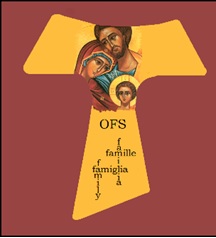
Ordo Franciscanus Saecularis
Consilium Internationale
FAMILY COMMISSION
Silvia Diana OFS
Traduccion: Mayara Ingrid Sousa Lima OFS
Young-people-in-our-fraternities (PDF)
As a family commission we want to offer special attention to the young people who enter our Order, many of our families share the Franciscan path between fathers, mothers and children, nephews / nieces, grandchildren, so we want to dedicate this work proposal to them for to better accompany this journey of youth vocation in our fraternities.
We found it very important that the proposal was presented by the same young people who make up our fraternities, we thank Mayara and Gabriela for this work of shared experiences.
Young people in our fraternities: realities, protagonism and assistance
By: Gabriela Consolaro Nabozny, Responsible for National Formation of YOUFRA Brazil;
Mayara Ingrid Sousa Lima, National Formation Coordinator of OFS Brazil.
One thing we can be sure of: Youth drives! It impelled Clara and Francisco who, even knowing the earthly pleasures and glories, felt provoked to something greater. They were called to do something more. In this search, they found answers which were different from the obvious ones. They found fulfillment in minority, dedicated their lives to following the Gospel and, thus, responded to the invitation of the Love that wanted to be loved. Young Clara and young Francisco answered the divine call, embraced the option and faced the changes and challenges that followed this sublime Encounter.
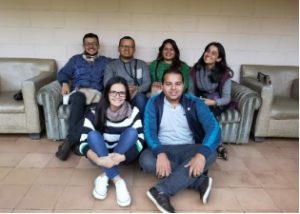 We also know that even today, the youth is driving! It drives so many “Claras” and so many “Franciscos” that they feel the same anxiety that ended up starting a revolution in Assisi. Today, all over the world, young hearts throb that feel the same desire for change, that yearn for the same invitation and, in responding, also face different obstacles. But who are they? What do you want? How to dialogue and follow this youth up?
We also know that even today, the youth is driving! It drives so many “Claras” and so many “Franciscos” that they feel the same anxiety that ended up starting a revolution in Assisi. Today, all over the world, young hearts throb that feel the same desire for change, that yearn for the same invitation and, in responding, also face different obstacles. But who are they? What do you want? How to dialogue and follow this youth up?
1- Demystifying stereotypes
The prerequisite for interacting and living with the youth is knowing them. To do so, it is extremely important that we can demystify some stereotypes that young people have carried throughout the years, as misconceptions of their real identity. It is classic to hear cliché phrases such as: “youth is the future, it is the great hope”, or even those negative views, “youth is messy, it is disinterested, it is unrestrained agitation, it is crazy life”.
Contrary to what is stated, today’s youth is as or more participatory than the previous ones. Whoever says that young people are alienated and passive, in fact, is representing their own desire and not reality. In this way, it is also a condition to dialogue with the youth in our fraternities, to break with these previous concepts or prejudices about young people as a primordial condition to understand the current phenomena in which youth are inserted.
Given the need to demystify such stereotypes, what is the real concept that we should build on youth? Social reality shows that there is not only one type of youth, but youth groups that constitute a heterogeneous group, with different opportunities, difficulties, facilities and power in societies. In this sense, youth, by definition, is a social construction, that is, the production of a certain society originated from the multiple ways in which it sees young people, a production in which, among other factors, stereotypes, historical moments, multiple references, in addition to different and diverse situations of class, gender, ethnicity, group etc.
Therefore, living with young people in our fraternities, part of the basic premise that there is not just a single youth, but youths, who are exposed to different personal, social, religious realities and who respond in different ways to them.
2- Youth protagonism
Pope Francis, in answering how young people might feel at the center of the construction of God’s project, highlights that it is “making them become protagonists or, better, allowing them to become protagonists”. On how to put this idea into effect, he adds that “if we want to talk to a young person, we must be mobile, and then he will slow down to hear us; it is he who will make that decision”.
Therefore, it is necessary for youth to be given the possibility of protagonism. The space for ideas to flow, for plans to get off the ground and for responsibilities to be felt and lived to the full. From a mutual effort, balancing walking more slowly and speeding up steps, it is possible to walk together.
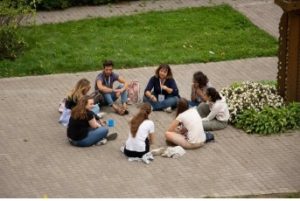 Pope Francis also said that “[…] the young man has something of a prophet and must realize it. You must be aware of having the wings of a prophet, the attitude of a prophet, the ability to prophesy, to speak, but also to do”. Based on this teaching, adults can help young people who already have an understanding of their full potential, to make them “fly even higher”. To young people who have not discovered everything they can do yet, let us be facilitators of this discovery, encouraging them, giving them confidence and responsibilities.
Pope Francis also said that “[…] the young man has something of a prophet and must realize it. You must be aware of having the wings of a prophet, the attitude of a prophet, the ability to prophesy, to speak, but also to do”. Based on this teaching, adults can help young people who already have an understanding of their full potential, to make them “fly even higher”. To young people who have not discovered everything they can do yet, let us be facilitators of this discovery, encouraging them, giving them confidence and responsibilities.
The guarantee of youth protagonism will be given to the extent that we are opening up the novelty and recognizing in it the manifestation of the Divine. Before looking at young people only as a deposit of information, it is necessary to notice the revelation of God on their faces. Attentive to the signs of the times, we are strengthening a leading role that is not only assistentialist, dependent or merely a reproducer of loose and unfounded ideas, but that is transformative. This conscious action will make them even more active, recognized in the ecclesial and social environment, so that no one despises him / her for being young (2Tm 4, 12).
3- The commitment to young people in our fraternities
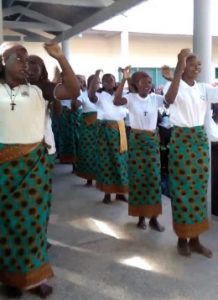
The OFS, by virtue of its own vocation, must be willing to communicate its experience of evangelical life to young people who are attracted to Saint Francis of Assisi and to seek the appropriate ways to present him, this is reflected with the presence of the Franciscan Youth (YOUFRA), for which the OFS considers itself particularly responsible (Article 96 CCGG).
It is in the perspective of the assistance, of those who stand by and remain attentive, that the relationship with the youth is built, which intensifies and becomes perfect when directed at the OFS’s relations with YOUFRA. This is because JUFRA is nothing more than the OFS in another phase of its existence. And, for this reason, they follow the same trajectory, in which each one leaves a footprint to form the ideal path in the construction of a life lived based on the Gospel and according to the teachings of Clara and Francisco de Assis.
In this sense, the OFS fraternities, through appropriate initiatives and dynamics, must promote the Franciscan youth vocation. Taking care of the vitality and expansion of the JUFRA fraternities and accompanying young people on their path of human and spiritual growth with proposals for activities and thematic content. (Article 97 CCGG).
It is worth mentioning that walking alongside, like Jesus with the Emmaus disciples does not mean imposing a model and dictating rules. It is, as Christ himself did, presenting himself for what he is, showing genuine interest, making himself available, sharing the table and life. Thus, as the hearts of Emmaus’ disciples burned, the young man today will also realize that he is welcomed and loved. “Being present, supporting and accompanying the itinerary towards authentic choices is, for the Church, a way to exercise her maternal function, to generate the children of God for freedom”.
Therefore, adopting an attitude of openness and humility, walking alongside, in a context of constant flow of information, is also allowing young people to be guaranteed their role. After all, like “Claras” and “Franciscos” of its time, the drive for change is the main driver of youth action.
4- Clues and paths for dialogue and assistance of youth
The first point for those who wish to dialogue with the young person is integral formation: human, Christian and social. It is not enough just to have the “good will” to perform this service, constant training is necessary, which makes it possible to have an expanded view of youth.
There is a need to develop a comprehensive training pedagogy that conquers and involves young people in an itinerary that will lead them to maturity in the faith. Secondly, we must strengthen the role of the family, through Franciscan witness to our sons and daughters. Because, convinced of the need to educate “children so that they arouse their interest in the community … and acquire the awareness of being living and active members of the people of God” and the fascination that St. Francis can exercise over them, be encouraged to formation of groups of children who, with the help of a pedagogy and an organization adapted to their age, are initiated in the knowledge and love of Franciscan life (Article 25 CCGG).
It is also necessary to create welcoming environments that meet the anxieties and desires of young people, and that have suitable methodologies and their own ideas. Local Fraternities will create space for young people, in welcoming, in the dynamics of meetings and guaranteeing them specific tasks within the Fraternity. Fraternity members should be made aware that the Fraternity can be organized in different ways, including in groups, to better cultivate fraternal life. In this sense, the Rule of the OFS encourages us to foster communion among members, holding regular meetings and frequent meetings, including with other Franciscan groups, especially young people, adopting the most appropriate means for growth in Franciscan and ecclesial life, encouraging each one to live in fraternity (Rule of the OFS. Article 24).
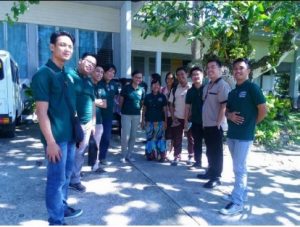 Finally, the joint journey with young people requires a comprehensive knowledge of the reality of young people, understanding them as protagonists of evangelization. The challenge is to look at youth as a whole and not just with a desirable model. We have to enlarge the lens and look from several angles. And, from the moment that this intergenerational walk hits the steps and becomes one, it is that we can, all and everyone, turn our gaze in the same direction. If our ears were open to the message, it will be understood by our youth. Young people should dance, sing, rejoice, but also fight, question and build the “civilization of love”.
Finally, the joint journey with young people requires a comprehensive knowledge of the reality of young people, understanding them as protagonists of evangelization. The challenge is to look at youth as a whole and not just with a desirable model. We have to enlarge the lens and look from several angles. And, from the moment that this intergenerational walk hits the steps and becomes one, it is that we can, all and everyone, turn our gaze in the same direction. If our ears were open to the message, it will be understood by our youth. Young people should dance, sing, rejoice, but also fight, question and build the “civilization of love”.
# Questions for reflection in the fraternity:
1. How can we dialogue with youth in our fraternities, considering the different youth realities that we have in society?
2. How can we make our fraternities welcoming environments for the different youths we meet along the way?
3. How to follow the youth up, ensuring the protagonism of the young ones?
4. In our family environment, how do we share our Franciscan experience with our sons and daughters, nephews and nieces, grandchildren and granddaughters?
5. How has our reality and our dialogue with Franciscan Youth been?
# References:
– General Constitutions of the Secular Franciscan Order, 2001.
– Rule of the Secular Franciscan Order.
– Directory of the mutual relations of OFS and YOUFRA Brazil.
– “Young people, faith and vocational discernment”. Final document of the XV Ordinary General Assembly of the Synod of Bishops on Youth.
– Conferência Nacional dos Bispos do Brasil, Evangelização da Juventude: Desafios e Perspectivas Pastorais. São Paulo: Paulinas, 2007. (Documentos da CNBB, n. 85).
– Civilizacion del amor proyecto y Mision: orientaciones para una Pastoral Juvenil Latinoamericana. Consejo Episcopal Latinoamericano-CELAM, 2013.
– ABRAMOVAY, M; ANDRADE, ER; ESTEVES, LCG (Org.) Juventudes: outros olhares sobre a diversidade. Organização das Nações Unidas para a educação, a ciência e a cultura- UNESCO, 2007.
– FRANCISCO, Papa. Deus é jovem: Uma conversa com Thomas Leoncini. São Paulo: Planeta do Brasil, 2018. p. 37.
– ZAVALLONI, Roberto. A personalidade de Santa Clara de Assis: Estudo Psicológico. Petrópolis-Brasil: FFB, 1995.
September 2020
